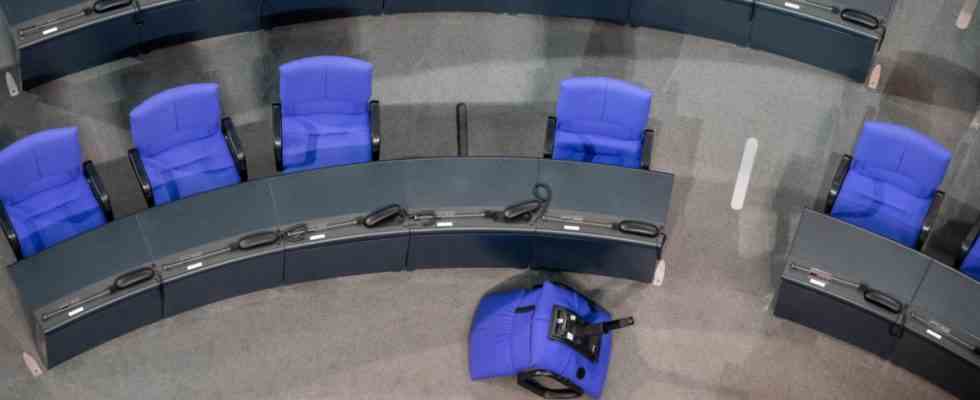The Bundestag has been growing steadily for two decades, which not only makes parliamentary work more difficult and cumbersome. It also costs a lot of money: Germany is spending more than 1.1 billion euros on its parliament this year, and this sum has also risen significantly. For years, the members of parliament in Berlin have been debating how a new electoral law could be used to (permanently) reduce the size of parliament. Also because of conflicting self-interests, they have made little progress. At the weekend, the faction leaders of the traffic light coalition agreed on a model that is to be decided this week.
Why is the Bundestag so big?
According to the law, 598 women and men should sit in the Bundestag, currently there are 736. This is because some MPs are directly elected in their constituency. If that is more for a party in a federal state than it is actually entitled to based on its share of second votes, it can still keep them (overhang mandates). In return, the other parties receive compensatory mandates. This case tends to occur more and more frequently, since the major parties perform worse overall, but still continue to win many direct mandates. This can be seen most clearly with the CSU in Bavaria: It won 45 constituencies directly in the most recent election, but would only have gotten 34 seats in parliament after the second votes that were actually decisive. However, since all 45 elected members were allowed to sit in the Bundestag, eleven overhang mandates were created, for which the other parties then received dozens of compensatory mandates.
How should Parliament get smaller again?
The traffic light coalition has now agreed on an electoral law that will take effect in the next election in 2025, if the Bundestag decides. In essence, it says: In the future there will be 630 MPs and no more overhang and compensation mandates. This means that Parliament is always the same size; it can happen that many a constituency winner no longer moves into the Bundestag.
What is the Basic Mandate Clause?
And the SPD, Greens and FDP want to delete a second special feature of the electoral law: the so-called basic mandate clause. This provides that a party that fails at the five percent hurdle can still get into the Bundestag, depending on its second vote result – and then if it wins at least three direct mandates. This rule recently benefited the left, which only got 4.9 percent of the second votes in 2021 and still has 39 MPs in the Bundestag. An abolition of the basic mandate clause could hit them hard, but not – as many are now unsure – the CSU. Because they will continue to be able to send at least most of their directly elected members to parliament, even if they remain below five percent nationwide.
What happens if no new law is passed?
That is unlikely as the traffic light coalition’s simple majority is enough to pass the new electoral law. If so, then the system of elections and seat allocation would basically remain the same – with one important innovation: a good two years ago, the grand coalition of Union and SPD decided to increase the number of constituencies from the 2025 election (and thus indirectly also the size of the Bundestag) from 299 to 280. For this they would have to be re-cut. With the new regulation now planned by the traffic light coalition, however, this will become obsolete, here the number of constituencies remains at 299.
What is the opposition saying?
The union wants to vote no and check whether to sue before the Federal Constitutional Court. “Constitutionally, we consider the proposal to be highly problematic,” says the parliamentary secretary of the CDU/CSU deputies in the Bundestag, Thorsten Frei (CDU). If direct mandates won are no longer allocated, this will lead to orphaned constituencies, particularly in urban regions and in the east, “where we have very hard-fought constituencies, and these regions will then not be directly represented in the German Bundestag.” The question of whether a lawsuit in Karlsruhe, as advocated above all by the CSU, makes sense is also controversial in the Union.
The left accuses the SPD, Greens and FDP of “shabby” action against political opponents. “This proposal is aimed solely at the left-wing opposition, which is being attempted to be politically flattened by means of the right to vote,” says Jan Korte, the parliamentary director of the left-wing faction. “With the deletion of the democratically sensible basic mandate clause, the traffic light parties of the AfD are fulfilling a great wish” – the ousting of the left from the Bundestag.
Has the CDU and CSU coalition come to terms?
Yes, on one point: by the weekend, their model envisaged that the Bundestag should have a total of 598 MPs, i.e. exactly twice as many as there are constituencies (299). The leaders of the parliamentary groups have now agreed that there should be a total of 630 MPs in 299 constituencies. Although this would make Parliament a bit larger, it would also reduce the problem of “orphan constituencies” lamented by the Union. Because then there should be significantly fewer directly elected candidates who do not move into the Bundestag after all.

